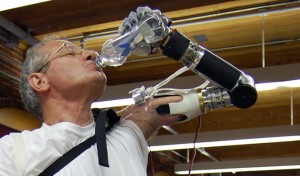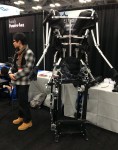 It’s been a bit hard to find clear trends, or brand new things, here at South by South West. It’s been more about refining things we already now and a lot of areas are maturing more and more. For example; wearables, 3D printers, the maker culture, connected cars and so on isn’t really new but are discussed a lot. We’ve known about it for quite some time now, but people starts to get a better understanding on how to relate to all this.
It’s been a bit hard to find clear trends, or brand new things, here at South by South West. It’s been more about refining things we already now and a lot of areas are maturing more and more. For example; wearables, 3D printers, the maker culture, connected cars and so on isn’t really new but are discussed a lot. We’ve known about it for quite some time now, but people starts to get a better understanding on how to relate to all this.
However, one area that is getting a lot of attention is personal privacy and what happens when everything is online. Lots of sessions talks about consequences of big data, meta data, data from devices (related to Internet of things), owning your data, mass surveillance and so on.
This area obviously got a lot of attention on day four, having two main sessions on Edward Snowden. Starting of with Snowden 2.0: A Field Report from the NSA Archives with Barton Gellman who is one of three journalists having direct contact with Snowden. A really interesting talk enlighten the enormous impact of PRISM and other massive data collection initiatives have on personal privacy. Nice to see a journalists that actually understand the technical stuff going on here and is able to share it with a wide audience. Now it’s not just the tin foil hats that starts to understand what this is all about.
Next up was a streamed live interview with Edward Snowdem himself, A Virtual Conversation with Edward Snowden. I wasn’t sure they would actually pull this off, but with heavily encrypted lines through seven proxy servers, they managed to get video streamed interview with him, though the frame rate was like 1 fps. The main problem today is that reasonable secure tools, such as PGP, are far too complicated for regular users. There may be many views of Snowdens actions, but he’s certainly made both people and companies aware of the problem of misusing mass surveillance data and we’re seeing more and more services being encrypted by default. But there’s still a long way to go.
During the two sessions, a not so well known issue was highlighted, that NSA partnered with global companies to deliberately put weaknesses in security applications and weakened random number generation in common used encryption algorithms, in order to “pass government approval”. When widely used algorithms, TPM-chips etc are compromised, you cannot trust anything being really secure. They might have thought mass surveillance was to be a good idea, but in reality it didn’t work.
Snowden argues that there is really no way to hide from NSA if you’re a target, but if we learn how to leverage from encryption, and the tools become easy to use, breaking the encryption would be too costly and of no value for mass surveillance. Unfortunatly it seems like we need whistleblowes, such as Snowden, for big companies to get it, and have theirdata and connections be secure and encrypted. What do we need to do in order to ensure all other companies follows? A more in depth interview summary is here.
Moving on to some trend spotting. There’s a lot of buzz about wearables, but finally I saw something new. Smartphone connected illuminated T-shirts that is made of soft cloth, is washable etc as any other textile. No circuit boards here! Those are still hand made and very costly, but they’ll soon be affordable. Trend spotters are also talking a lot about google glasses, having sensors everywhere, especially in the sports area, where we’ll be able to monitor heart rates, speeds etc of athletes. Some argues that sensors in our clothes will soon solve a lot of health care issues as well. A lot of focus is also on autonomous cars and what we’ll have on the journey getting there, such as the car knowing where your heading and so on. But of course privacy comes into play here as well.



